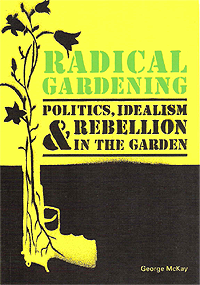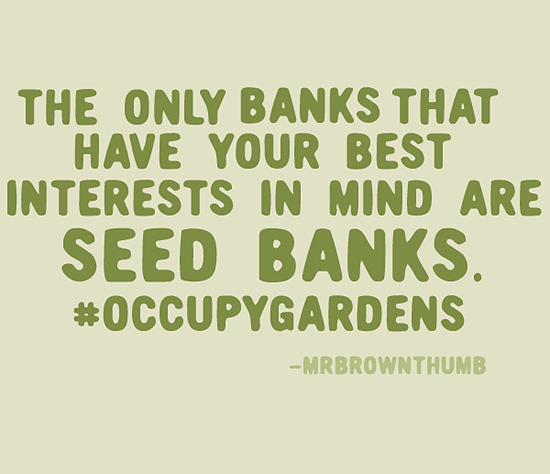
Once while riding in a car I saw a ‘Keep Your Laws Off My Body” bumper sticker and inside my head I shouted back “Keep Your Politics Out Of My Garden!” I surprised myself because in my youth I’d been anything but apolitical. I’d participated in rallies, marches, protests, voter registration drives and volunteered on a political campaign before I was old enough to vote myself. Perhaps I was burnt-out on politics after being immersed in it at an early age. The last place I thought politics belonged was in the garden.
Recently I came across a mention of the book Radical Gardening: Politics, Idealism & Rebellion in the Garden by George McKay. Intrigued by the title and cover I sent off a request to the publisher for a review copy which they granted me. After reading this book I’ve come to the realization that my opinion that gardening should be free of the political is myopic to say the least. Gardens and the gardened landscapes are deeply rooted (ugh) in the political. George McKay uses historical examples to illustrate an "intimate relationship between politics, social change and landscape or garden" many of which mirror those taking place today.

The chapter on green and open spaces and their uses in protests reminds me of the #OccupyWallStreet movement. Victorian public parks were intended to "improve" the park users and to encourage local pride and patriotism. The parks weren't about public health, as much as public order. Statues of the Queen, Prince Albert, local dignitaries and benefactors stood high above parks so they could be looked up to physically and metaphorically. The parks were seen as a place where the affluent and the working class could mix and hopefully the contact with the affluent would rub off on the working class. Ironically, while public open spaces were seen as a way to civilize the working class, their nature allowed them to be used for demonstrations and civil unrest.
When #OccupyWallStreet took "Zuccotti Park" in Lower Manhattan issues of the park’s ownership, the effect of the protesters on safety and public health were raised echoing the same complaints raised in the book about demonstrators using Chicago's Hyde Park.
The violent reaction to 'Occupy' events across the country have a striking resemblance to the reaction against the People's Park at the University of California at Berkeley in 1969 discussed in the book.
On October 8th, I started the #OccupyGardens hashtag on Twitter as a tongue-in-cheek way to motivate me to do fall garden cleanup and save seeds from my garden. The more I thought about it I started to wonder why the ‘Occupy’ movement didn't address the issues of public spaces, vegetable gardening and seed saving as a means of self-sufficiency. 'Growing a garden has become-at least potentially-an act of resistance. But it's not simply a gesture of refusal. It's a positive act. It's praxis,' explains George McKay.
Since I started using #OccupyGardens as a way to express that we need to spend time outdoors, rethink what we personally, and as a society, value, I've seen two instances of gardens and gardening being incorporated in 'Occupy' demonstrations and I'm glad that people are realizing there's a connection between gardens and what the 'Occupy' movements across the globe want to achieve.

After Arizona passed SB 1070 I joined the boycott of the state. This year in the garden I grew several vegetable crops that the state exports as part of my boycott. I haven’t mentioned it to anyone because I thought a ‘protest garden’ as small as mine is was silly. When I read the 'Planting as a form of protest' quote by Paul Gough in Radical Gardening it gave my idea validity and I understood that next year it has to be bigger. Gardens have never been apolitical...
'If I sowed, planted or dealt in seeds; whatever I did had first in view the destruction of infamous tyrants.' - William Cobbett, 1819.
... my instance that they be came from a "parochial or suburban or landed versions of garden understanding." Gardens don't have to be a place of repose to forget the realities of our lives and society. If gardens are extensions of our homes and ourselves then they too can embody the politics of our existence.
In the forward to the book George writes: "My hope is that you will find something new here, thought-provoking, inspiring, and that you will experience the sense of excitement I did on learning about the ways the generous space of the garden can have political resonance." Radical Gardening has done just that for me. It has opened my eyes and given me new insight into what a garden is and what it can mean, celebrate and how it can be approached. I can't recommend Radical Gardening more, it is a fascinating look at the way gardens have shaped people, communities, policies and land use. It explores areas such as public parks, Utopian societies, organics and permaculture, community gardens and garden design.
George McKay is a leading British author on aspects of alternative culture through music, protest and lifestyle. He is Professor of Cultural Studies at the University of Salford. You can visit his website (where he regretfully doesn’t blog about his garden) and you can buy his book Radical Gardening online.
Edit: Over on Google+ someone shared one of the #OccupyGardens images I posted that reads The only banks that have your best interests in mind are seed banks. A person asked "who controls the seed banks?" The truth is that we can control the seed banks by creating personal seed banks, seed lending libraries and saving our own seeds, and hosting seed swaps in our own communities.
First published on mrbrownthumb's seed saving blog, http://mrbrownthumb.blogspot.com/2011/11/radical-gardening-and-occupygardens.html

